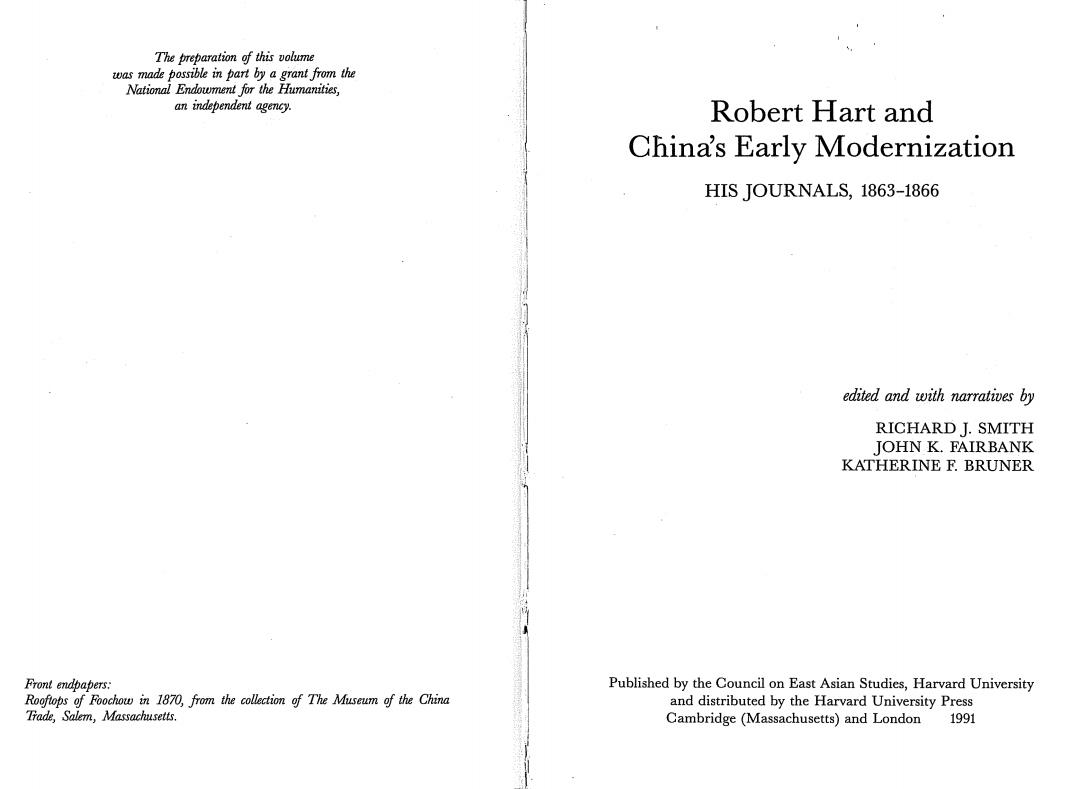
The preparation of this volume was made possible in part by a grant from the National Endowment for the Humanities, an independent agency. Robert Hart and China's Early Modernization HIS JOURNALS,1863-1866 edited and with narratives by RICHARD I.SMITH JOHN K.FAIRBANK KATHERINE F.BRUNER Front endpapers: Published by the Council on East Asian Studies,Harvard University Rooftops of Foochow in 1870,from the collection of The Museum of the China and distributed by the Harvard University Press Trade,Salem,Massachusetts. Cambridge (Massachusetts)and London 1991
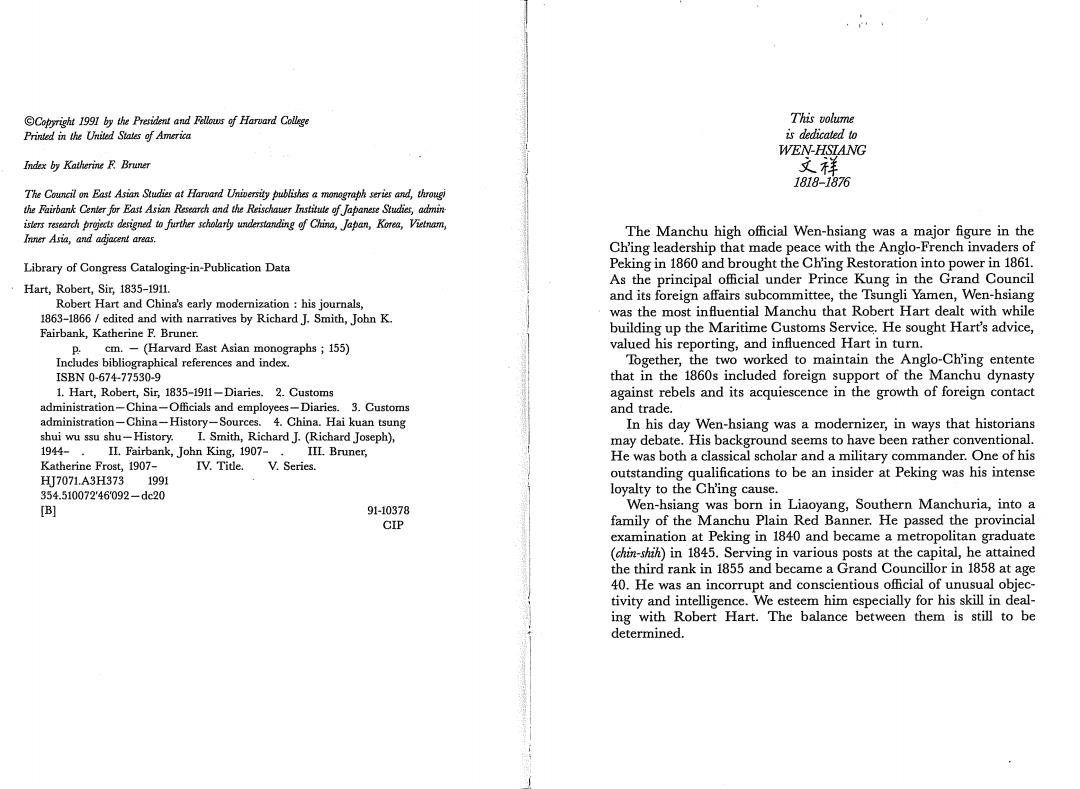
Copyright 1991 by the President and Fellows of Harvard College This volume Printed in the United States of America is dedicated to WEN-HSIANG Index by Katherine F.Bruner 文祥 1818-1876 The Council on East Asian Studies at Harvard University publishes a monograph series and,througi the Fairbank Center for East Asian Research and the Reischawer Institule of Japanese Studies,admin isters research projects designed to further scholarly understanding of China,Japan,Korea,Vietnam Inner Asia,and adjacent areas. The Manchu high official Wen-hsiang was a major figure in the Ch'ing leadership that made peace with the Anglo-French invaders of Library of Congress Cataloging-in-Publication Data Peking in 1860 and brought the Ch'ing Restoration into power in 1861. As the principal official under Prince Kung in the Grand Council Hart,Robert,Sir,1835-1911. Robert Hart and China's early modernization his journals, and its foreign affairs subcommittee,the Tsungli Yamen,Wen-hsiang 1863-1866/edited and with narratives by Richard J.Smith,John K. was the most influential Manchu that Robert Hart dealt with while Fairbank,Katherine F.Bruner. building up the Maritime Customs Service.He sought Hart's advice, cm.-(Harvard East Asian monographs 155) valued his reporting,and influenced Hart in turn. Includes bibliographical references and index. Together,the two worked to maintain the Anglo-Ch'ing entente ISBN0-674-77530-9 that in the 1860s included foreign support of the Manchu dynasty 1.Hart,Robert,Sir,1835-1911-Diaries.2.Customs against rebels and its acquiescence in the growth of foreign contact administration-China-Officials and employees-Diaries.3.Customs and trade. administration-China-History-Sources.4.China.Hai kuan tsung In his day Wen-hsiang was a modernizer,in ways that historians shui wu ssu shu-History.I.Smith,Richard J.(Richard Joseph), may debate.His background seems to have been rather conventional. 1944-. II.Fairbank,John King,1907-.III.Bruner, He was both a classical scholar and a military commander.One of his Katherine Frost,1907- IV.Title.V.Series. HJ7071.A3H3731991 outstanding qualifications to be an insider at Peking was his intense 354.510072'46'092-dc20 loyalty to the Ch'ing cause. B 91-10378 Wen-hsiang was born in Liaoyang,Southern Manchuria,into a CIP family of the Manchu Plain Red Banner.He passed the provincial examination at Peking in 1840 and became a metropolitan graduate (chin-shih)in 1845.Serving in various posts at the capital,he attained the third rank in 1855 and became a Grand Councillor in 1858 at age 40.He was an incorrupt and conscientious official of unusual objec- tivity and intelligence.We esteem him especially for his skill in deal- ing with Robert Hart.The balance between them is still to be determined
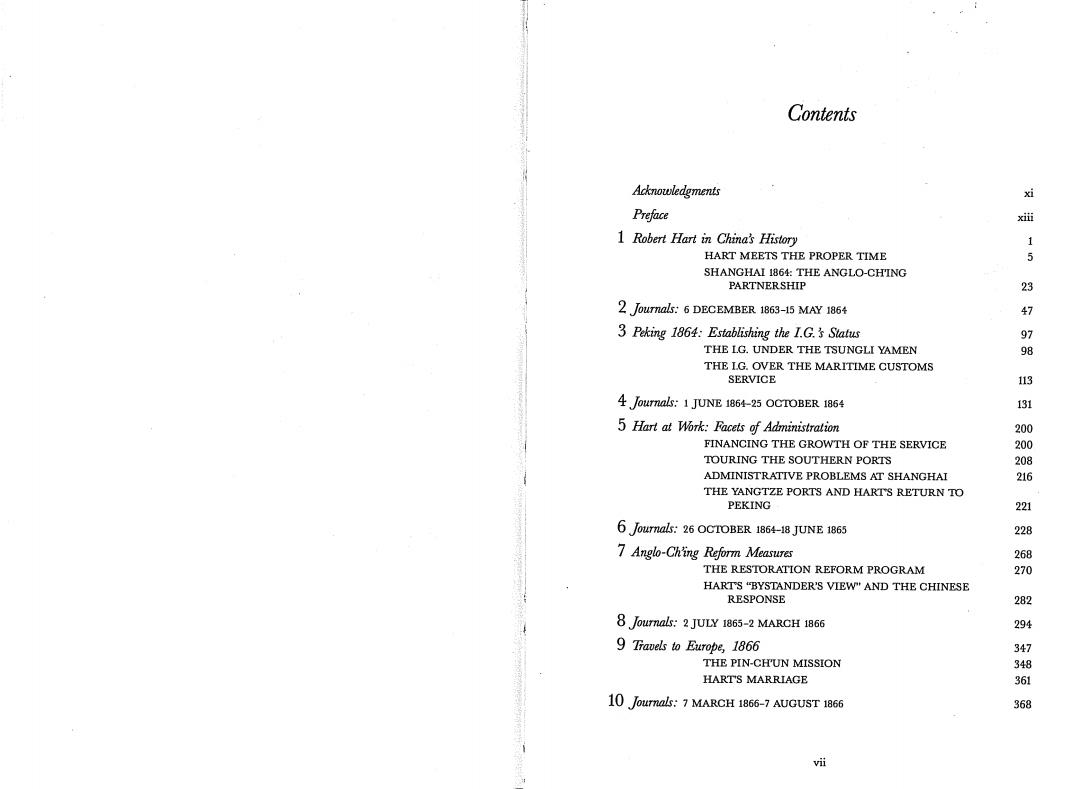
Contents Acknowledgments t Preface xiii 1 Robert Hart in China's History 1 HART MEETS THE PROPER TIME SHANGHAI 1864:THE ANGLO-CHING PARTNERSHIP 23 2 Journals:6 DECEMBER 1863-15 MAY186 47 3 Peking 1864:Establishing the I.G.'s Status 97 THE LG.UNDER THE TSUNGLI YAMEN 98 THE LG.OVER THE MARITIME CUSTOMS SERVICE 113 4 Journals:1 JUNE 1864-25 OCTOBER 1864 131 5 Hart at Work:Facets of Administralion 200 FINANCING THE GROWTH OF THE SERVICE 200 TOURING THE SOUTHERN PORTS 208 ADMINISTRATIVE PROBLEMS AT SHANGHAI 216 THE YANGTZE PORTS AND HARTS RETURN TO PEKING 221 6 fournals:26 OCTOBER 1864-18 JUNE 1865 228 7 Anglo-Ch'ing Reform Measures 268 THE RESTORATION REFORM PROGRAM 270 HARTS "BYSTANDER'S VIEW AND THE CHINESE RESPONSE 282 8Journals:2JULY 1865-2 MARGH 1866 294 9 Tiavels to Europe,1866 347 THE PIN-CHUN MISSION 348 HARTS MARRIAGE 361 10 Journals:7MARCH 1866-7 AUGUST166 368 vii

CONTENTS 11 Perspectives and Hypotheses 397 HART AS INTERMEDIARY 397 CHINAS DOMESTIC TRANSFORMATION 399 THE PROVENANCE OF REFORM PROPOSALS 402 HARTS INFLUENCE-THE ALCOCK CONVENTION Illustrations OF1869 405 THE CUSTOMS AND IMPERIALISM 411 Appendixes 413 A:FOREIGNERS'POSITIONS IN THE IMPERIAL MARITIME CUSTOMS 413 MAPS B:LETTERS FROM HART TO E.C.BOWRA 415 1.Partial Plan of Shanghai,1855 24 C:LETTERS FROM HART TO HESTER JANE BREDON 2.Area of Li Hung-chang's and Gordon's Operations, 419 1863-1864 35 Notes 431 3.Plan of Peking 102-103 Bibliography 114 533 4.Eventual Growth of the Treaty Port System 5.Routes from Tientsin to Peking,1860s 192-193 Glossary/Index 547 6.Cities Visisted by Hart during His Tour of the Treaty Port3,1864-1865 201 TABLES 1.Ch'ing Personnel in Office,1863-1864 104 2.Form for Reporting Quarterly Returns 204 3.Foreigners'Positions in the Maritime Customs (Appendix A) 415 PHOTOGRAPHS Rooftops of Foochow front endpapers Russell Company 10 Li Hung-chang 37 The Russell Company Steamship Huquong 65 Wen-hsiang 106 General Gordon in Chinese Dress 189 A Peking Cart 193 Wellington Street,Hong Kong 209 The Front Gate of the City Walls of the Tartar City of Peking 269 A Peking hu-t'ung 272 Prince Kung,Peking,4 November 1860 276 The Pin-ch'un Mission at Stockholm,1866 358 Hester Jane Hart,Lady Hart,and Robert Hart 362 vi进i
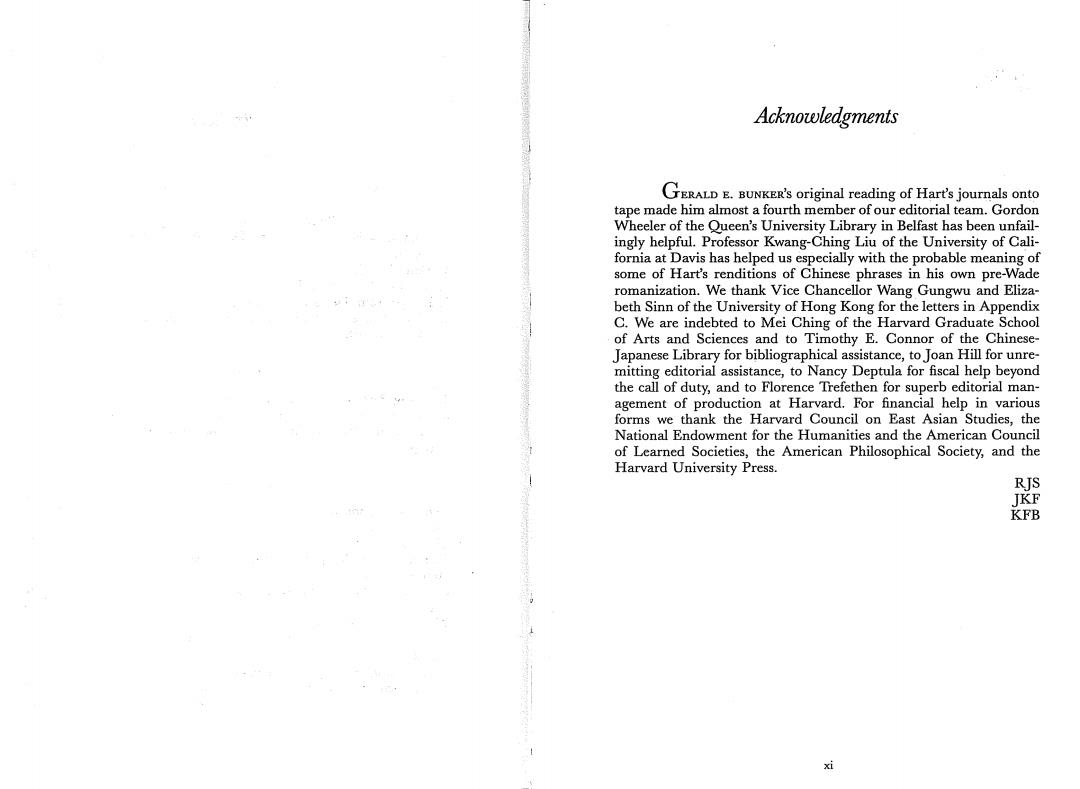
Acknowledgments GERALD E.BUNKER's original reading of Hart's journals onto tape made him almost a fourth member of our editorial team.Gordon Wheeler of the Queen's University Library in Belfast has been unfail- ingly helpful.Professor Kwang-Ching Liu of the University of Cali- fornia at Davis has helped us especially with the probable meaning of some of Hart's renditions of Chinese phrases in his own pre-Wade romanization.We thank Vice Chancellor Wang Gungwu and Eliza- beth Sinn of the University of Hong Kong for the letters in Appendix C.We are indebted to Mei Ching of the Harvard Graduate School of Arts and Sciences and to Timothy E.Connor of the Chinese- Japanese Library for bibliographical assistance,to Joan Hill for unre- mitting editorial assistance,to Nancy Deptula for fiscal help beyond the call of duty,and to Florence Trefethen for superb editorial man- agement of production at Harvard.For financial help in various forms we thank the Harvard Council on East Asian Studies,the National Endowment for the Humanities and the American Council of Learned Societies,the American Philosophical Society,and the Harvard University Press. RJS JKF KFB 女
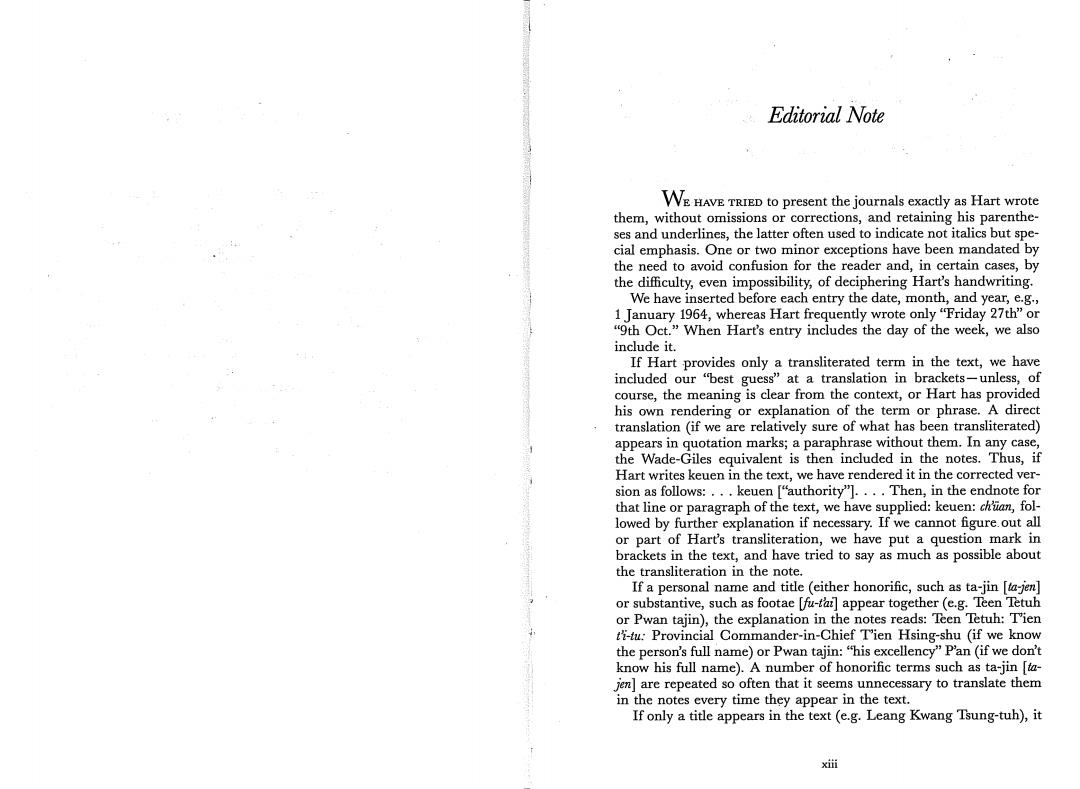
Editorial Note WE HAVE TRIED to present the journals exactly as Hart wrote them,without omissions or corrections,and retaining his parenthe- ses and underlines,the latter often used to indicate not italics but spe- cial emphasis.One or two minor exceptions have been mandated by the need to avoid confusion for the reader and,in certain cases,by the difficulty,even impossibility,of deciphering Hart's handwriting. We have inserted before each entry the date,month,and year,e.g., 1 January 1964,whereas Hart frequently wrote only "Friday 27th"or "9th Oct."When Hart's entry includes the day of the week,we also include it. If Hart provides only a transliterated term in the text,we have included our "best guess"at a translation in brackets-unless,of course,the meaning is clear from the context,or Hart has provided his own rendering or explanation of the term or phrase.A direct translation (if we are relatively sure of what has been transliterated) appears in quotation marks;a paraphrase without them.In any case, the Wade-Giles equivalent is then included in the notes.Thus,if Hart writes keuen in the text,we have rendered it in the corrected ver- sion as follows:...keuen ["authority"]....Then,in the endnote for that line or paragraph of the text,we have supplied:keuen:chtan,fol- lowed by further explanation if necessary.If we cannot figure.out all or part of Hart's transliteration,we have put a question mark in brackets in the text,and have tried to say as much as possible about the transliteration in the note. If a personal name and title (either honorific,such as ta-jin [tajen] or substantive,such as footae [fu-tai]appear together(e.g.Teen Tetuh or Pwan tajin),the explanation in the notes reads:Teen Tetuh:Tien -tu:Provincial Commander-in-Chief T'ien Hsing-shu (if we know the person's full name)or Pwan tajin:"his excellency"P'an (if we don't know his full name).A number of honorific terms such as ta-jin [ta- jen]are repeated so often that it seems unnecessary to translate them in the notes every time they appear in the text. If only a title appears in the text(e.g.Leang Kwang Tsung-tuh),it xiⅲi
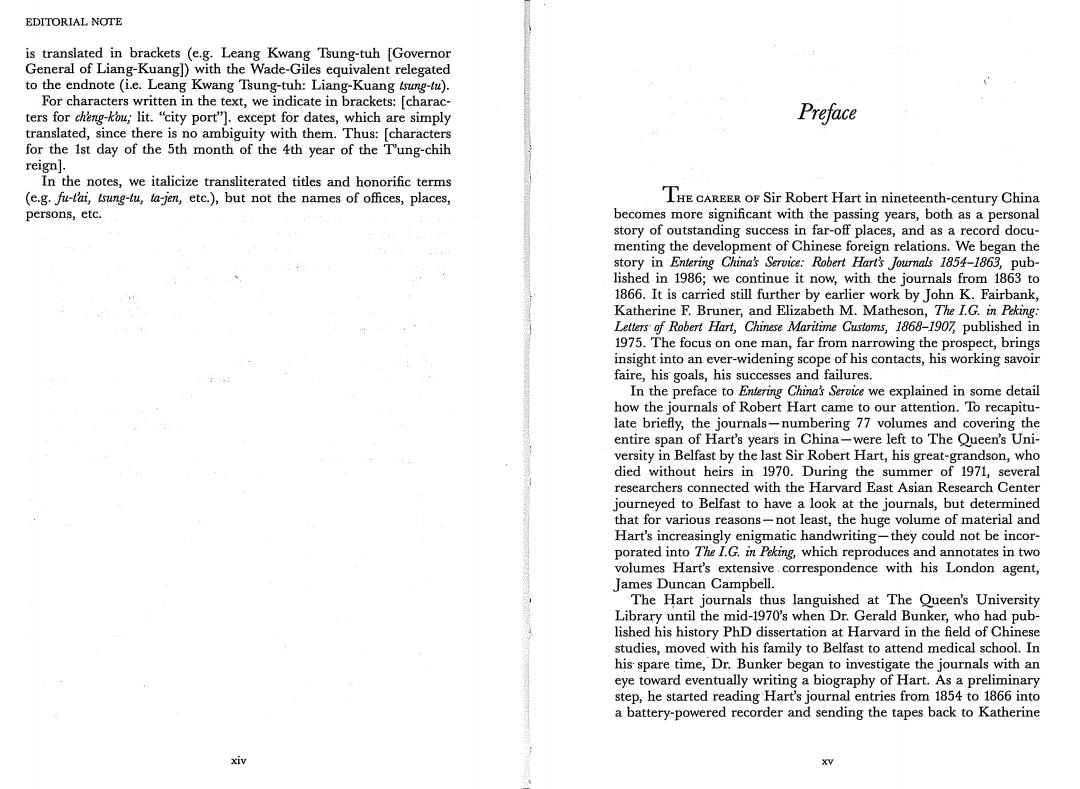
EDITORIAL NOTE is translated in brackets (e.g.Leang Kwang Tsung-tuh [Governor General of Liang-Kuangl)with the Wade-Giles equivalent relegated to the endnote (i.e.Leang Kwang Tsung-tuh:Liang-Kuang tsung-tu). For characters written in the text,we indicate in brackets:[charac- ters for cheng-kou;lit."city port"].except for dates,which are simply Preface translated,since there is no ambiguity with them.Thus:[characters for the Ist day of the 5th month of the 4th year of the Tung-chih reign. In the notes,we italicize transliterated titles and honorific terms (e.g.fu-tai,isung-tu,tajen,etc.),but not the names of offices,places, THE CAREER oF Sir Robert Hart in nineteenth-century China persons,etc. becomes more significant with the passing years,both as a personal story of outstanding success in far-off places,and as a record docu- menting the development of Chinese foreign relations.We began the story in Entering China's Service:Robert Hart's Journals 1854-1863,pub- lished in 1986;we continue it now,with the journals from 1863 to 1866.It is carried still further by earlier work by John K.Fairbank, Katherine F.Bruner,and Elizabeth M.Matheson,The I.G.in Peking: Letters of Robert Hart,Chinese Maritime Customs,1868-1907,published in 1975.The focus on one man,far from narrowing the prospect,brings insight into an ever-widening scope of his contacts,his working savoir faire,his goals,his successes and failures. In the preface to Entering Chinas Service we explained in some detail how the journals of Robert Hart came to our attention.To recapitu- late briefly,the journals-numbering 77 volumes and covering the entire span of Hart's years in China-were left to The Queen's Uni- versity in Belfast by the last Sir Robert Hart,his great-grandson,who died without heirs in 1970.During the summer of 1971,several researchers connected with the Harvard East Asian Research Center journeyed to Belfast to have a look at the journals,but determined that for various reasons-not least,the huge volume of material and Hart's increasingly enigmatic handwriting-they could not be incor- porated into The I.G.in Peking,which reproduces and annotates in two volumes Hart's extensive.correspondence with his London agent, James Duncan Campbell. The Hart journals thus languished at The Queen's University Library until the mid-1970's when Dr.Gerald Bunker,who had pub- lished his history PhD dissertation at Harvard in the field of Chinese studies,moved with his family to Belfast to attend medical school.In his spare time,Dr.Bunker began to investigate the journals with an eye toward eventually writing a biography of Hart.As a preliminary step,he started reading Hart's journal entries from 1854 to 1866 into a battery-powered recorder and sending the tapes back to Katherine xiv
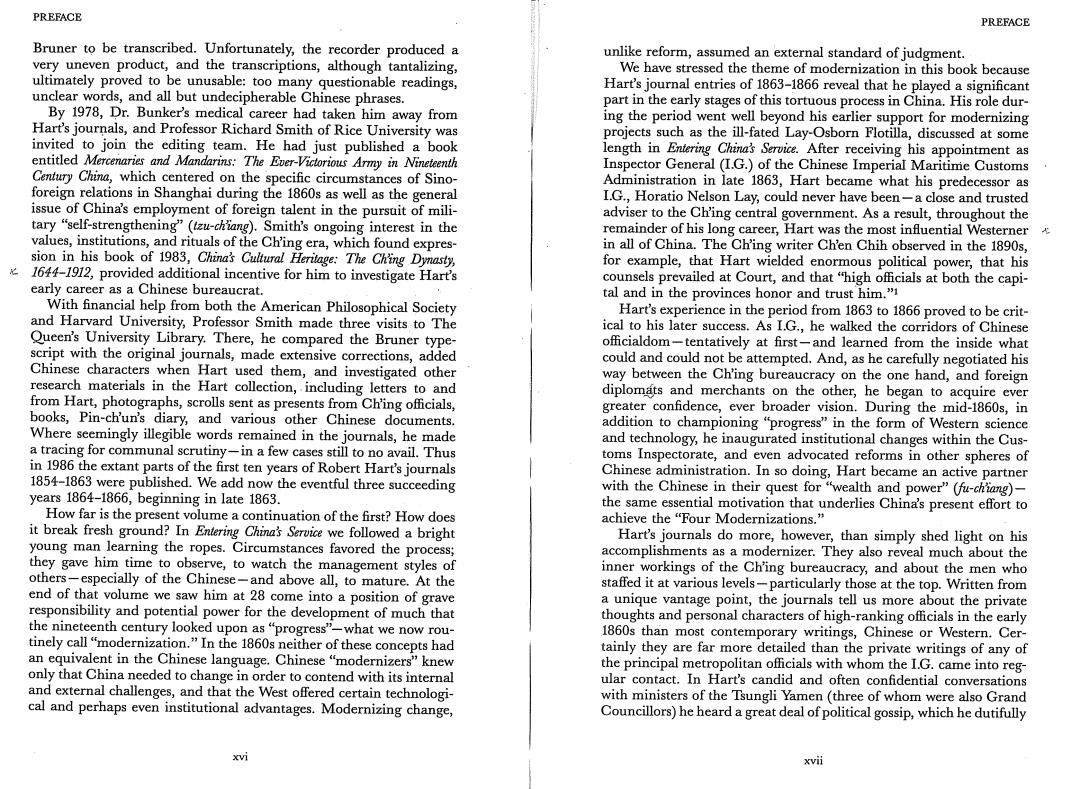
PREFACE PREFACE Bruner to be transcribed.Unfortunately,the recorder produced a unlike reform,assumed an external standard of judgment. very uneven product,and the transcriptions,although tantalizing, We have stressed the theme of modernization in this book because ultimately proved to be unusable:too many questionable readings, Hart's journal entries of 1863-1866 reveal that he played a significant unclear words,and all but undecipherable Chinese phrases. part in the early stages of this tortuous process in China.His role dur- By 1978,Dr.Bunker's medical career had taken him away from ing the period went well beyond his earlier support for modernizing Hart's journals,and Professor Richard Smith of Rice University was projects such as the ill-fated Lay-Osborn Flotilla,discussed at some invited to join the editing team.He had just published a book length in Entering Chinas Service.After receiving his appointment as entitled Mercenaries and Mandarins:The Ever-Victorious Army in Nineteenth Inspector General(I.G.)of the Chinese Imperial Maritime Customs Century China,which centered on the specific circumstances of Sino- Administration in late 1863,Hart became what his predecessor as foreign relations in Shanghai during the 1860s as well as the general I.G.,Horatio Nelson Lay,could never have been-a close and trusted issue of China's employment of foreign talent in the pursuit of mili- adviser to the Ch'ing central government.As a result,throughout the tary "self-strengthening"(tzu-chiang).Smith's ongoing interest in the remainder of his long career,Hart was the most influential Westerner values,institutions,and rituals of the Ch'ing era,which found expres- in all of China.The Ch'ing writer Ch'en Chih observed in the 1890s, sion in his book of 1983,China's Cultural Heritage:The Ch'ing Dynasty, for example,that Hart wielded enormous political power,that his 1644-1912,provided additional incentive for him to investigate Hart's counsels prevailed at Court,and that"high officials at both the capi- early career as a Chinese bureaucrat. tal and in the provinces honor and trust him." With financial help from both the American Philosophical Society Hart's experience in the period from 1863 to 1866 proved to be crit- and Harvard University,Professor Smith made three visits to The Queen's University Library.There,he compared the Bruner type- ical to his later success.As I.G.,he walked the corridors of Chinese officialdom-tentatively at first-and learned from the inside what script with the original journals,made extensive corrections,added could and could not be attempted.And,as he carefully negotiated his Chinese characters when Hart used them,and investigated other way between the Ch'ing bureaucracy on the one hand,and foreign research materials in the Hart collection,including letters to and diplomats and merchants on the other,he began to acquire ever from Hart,photographs,scrolls sent as presents from Ch'ing officials, greater confidence,ever broader vision.During the mid-1860s,in books,Pin-ch'un's diary,and various other Chinese documents. addition to championing "progress"in the form of Western science Where seemingly illegible words remained in the journals,he made and technology,he inaugurated institutional changes within the Cus- a tracing for communal scrutiny-in a few cases still to no avail.Thus in 1986 the extant parts of the first ten years of Robert Hart's journals toms Inspectorate,and even advocated reforms in other spheres of 1854-1863 were published.We add now the eventful three succeeding Chinese administration.In so doing,Hart became an active partner years 1864-1866,beginning in late 1863. with the Chinese in their quest for“wealth and power'”(fu-ch'iang)- the same essential motivation that underlies China's present effort to How far is the present volume a continuation of the first?How does achieve the "Four Modernizations." it break fresh ground?In Entering Chinas Service we followed a bright Hart's journals do more,however,than simply shed light on his young man learning the ropes.Circumstances favored the process; accomplishments as a modernizer.They also reveal much about the they gave him time to observe,to watch the management styles of others-especially of the Chinese-and above all,to mature.At the inner workings of the Ch'ing bureaucracy,and about the men who staffed it at various levels-particularly those at the top.Written from end of that volume we saw him at 28 come into a position of grave a unique vantage point,the journals tell us more about the private responsibility and potential power for the development of much that thoughts and personal characters of high-ranking officials in the early the nineteenth century looked upon as"progress"-what we now rou- 1860s than most contemporary writings,Chinese or Western.Cer- tinely call "modernization."In the 1860s neither of these concepts had tainly they are far more detailed than the private writings of any of an equivalent in the Chinese language.Chinese "modernizers"knew the principal metropolitan officials with whom the I.G.came into reg- only that China needed to change in order to contend with its internal ular contact.In Hart's candid and often confidential conversations and external challenges,and that the West offered certain technologi- with ministers of the Tsungli Yamen(three of whom were also Grand cal and perhaps even institutional advantages.Modernizing change, Councillors)he heard a great deal of political gossip,which he dutifully xvi xvii
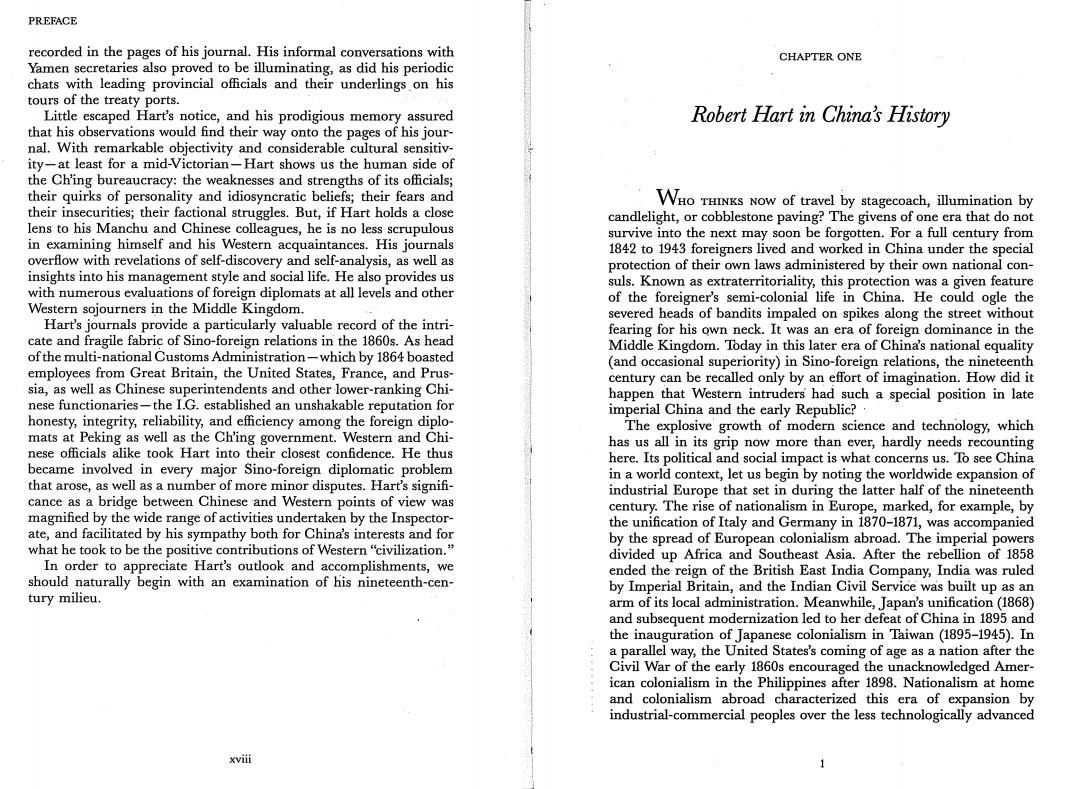
PREFACE recorded in the pages of his journal.His informal conversations with CHAPTER ONE Yamen secretaries also proved to be illuminating,as did his periodic chats with leading provincial officials and their underlings on his tours of the treaty ports. Little escaped Hart's notice,and his prodigious memory assured Robert Hart in China's History that his observations would find their way onto the pages of his jour- nal.With remarkable objectivity and considerable cultural sensitiv- ity-at least for a mid-Victorian-Hart shows us the human side of the Ch'ing bureaucracy:the weaknesses and strengths of its officials; their quirks of personality and idiosyncratic beliefs;their fears and their insecurities;their factional struggles.But,if Hart holds a close WHo THINKs Now of travel by stagecoach,illumination by candlelight,or cobblestone paving?The givens of one era that do not lens to his Manchu and Chinese colleagues,he is no less scrupulous survive into the next may soon be forgotten.For a full century from in examining himself and his Western acquaintances.His journals 1842 to 1943 foreigners lived and worked in China under the special overflow with revelations of self-discovery and self-analysis,as well as protection of their own laws administered by their own national con- insights into his management style and social life.He also provides us suls.Known as extraterritoriality,this protection was a given feature with numerous evaluations of foreign diplomats at all levels and other of the foreigner's semi-colonial life in China.He could ogle the Western sojourners in the Middle Kingdom. severed heads of bandits impaled on spikes along the street without Hart's journals provide a particularly valuable record of the intri- fearing for his own neck.It was an era of foreign dominance in the cate and fragile fabric of Sino-foreign relations in the 1860s.As head Middle Kingdom.Today in this later era of China's national equality of the multi-national Customs Administration-which by 1864 boasted (and occasional superiority)in Sino-foreign relations,the nineteenth employees from Great Britain,the United States,France,and Prus- century can be recalled only by an effort of imagination.How did it sia,as well as Chinese superintendents and other lower-ranking Chi- happen that Western intruders had such a special position in late nese functionaries-the I.G.established an unshakable reputation for imperial China and the early Republic? honesty,integrity,reliability,and efficiency among the foreign diplo- The explosive growth of modern science and technology,which mats at Peking as well as the Ch'ing government.Western and Chi- has us all in its grip now more than ever,hardly needs recounting nese officials alike took Hart into their closest confidence.He thus here.Its political and social impact is what concerns us.To see China became involved in every major Sino-foreign diplomatic problem in a world context,let us begin by noting the worldwide expansion of that arose,as well as a number of more minor disputes.Hart's signifi- industrial Europe that set in during the latter half of the nineteenth cance as a bridge between Chinese and Western points of view was century.The rise of nationalism in Europe,marked,for example,by magnified by the wide range of activities undertaken by the Inspector- the unification of Italy and Germany in 1870-1871,was accompanied ate,and facilitated by his sympathy both for China's interests and for by the spread of European colonialism abroad.The imperial powers what he took to be the positive contributions of Western"civilization." divided up Africa and Southeast Asia.After the rebellion of 1858 In order to appreciate Hart's outlook and accomplishments,we ended the reign of the British East India Company,India was ruled should naturally begin with an examination of his nineteenth-cen- by Imperial Britain,and the Indian Civil Service was built up as an tury milieu. arm of its local administration.Meanwhile,Japan's unification(1868) and subsequent modernization led to her defeat of China in 1895 and the inauguration of Japanese colonialism in Taiwan (1895-1945).In a parallel way,the United States's coming of age as a nation after the Civil War of the early 1860s encouraged the unacknowledged Amer- ican colonialism in the Philippines after 1898.Nationalism at home and colonialism abroad characterized this era of expansion by industrial-commercial peoples over the less technologically advanced xviⅷ 1
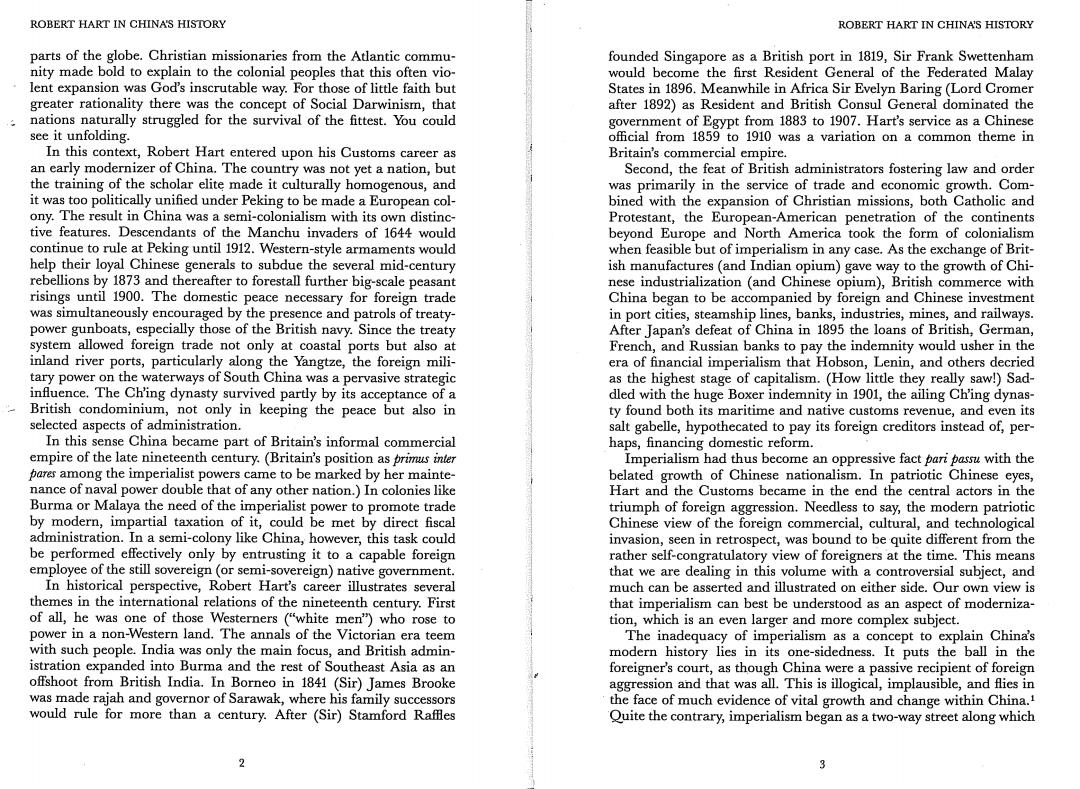
ROBERT HART IN CHINAS HISTORY ROBERT HART IN CHINAS HISTORY parts of the globe.Christian missionaries from the Atlantic commu- founded Singapore as a British port in 1819,Sir Frank Swettenham nity made bold to explain to the colonial peoples that this often vio- would become the first Resident General of the Federated Malay lent expansion was God's inscrutable way.For those of little faith but States in 1896.Meanwhile in Africa Sir Evelyn Baring (Lord Cromer greater rationality there was the concept of Social Darwinism,that after 1892)as Resident and British Consul General dominated the nations naturally struggled for the survival of the fittest.You could government of Egypt from 1883 to 1907.Hart's service as a Chinese see it unfolding. official from 1859 to 1910 was a variation on a common theme in In this context,Robert Hart entered upon his Customs career as Britain's commercial empire. an early modernizer of China.The country was not yet a nation,but Second,the feat of British administrators fostering law and order the training of the scholar elite made it culturally homogenous,and was primarily in the service of trade and economic growth.Com- it was too politically unified under Peking to be made a European col- bined with the expansion of Christian missions,both Catholic and ony.The result in China was a semi-colonialism with its own distinc- Protestant,the European-American penetration of the continents tive features.Descendants of the Manchu invaders of 1644 would beyond Europe and North America took the form of colonialism continue to rule at Peking until 1912.Western-style armaments would when feasible but of imperialism in any case.As the exchange of Brit- help their loyal Chinese generals to subdue the several mid-century ish manufactures(and Indian opium)gave way to the growth of Chi- rebellions by 1873 and thereafter to forestall further big-scale peasant nese industrialization (and Chinese opium),British commerce with risings until 1900.The domestic peace necessary for foreign trade China began to be accompanied by foreign and Chinese investment was simultaneously encouraged by the presence and patrols of treaty- in port cities,steamship lines,banks,industries,mines,and railways. power gunboats,especially those of the British navy.Since the treaty After Japan's defeat of China in 1895 the loans of British,German, system allowed foreign trade not only at coastal ports but also at French,and Russian banks to pay the indemnity would usher in the inland river ports,particularly along the Yangtze,the foreign mili- era of financial imperialism that Hobson,Lenin,and others decried tary power on the waterways of South China was a pervasive strategic as the highest stage of capitalism.(How little they really saw!)Sad- influence.The Ch'ing dynasty survived partly by its acceptance of a dled with the huge Boxer indemnity in 1901,the ailing Ch'ing dynas- British condominium,not only in keeping the peace but also in ty found both its maritime and native customs revenue,and even its selected aspects of administration. salt gabelle,hypothecated to pay its foreign creditors instead of,per- In this sense China became part of Britain's informal commercial haps,financing domestic reform. empire of the late nineteenth century.(Britain's position as primus inter Imperialism had thus become an oppressive fact pari passu with the pares among the imperialist powers came to be marked by her mainte- belated growth of Chinese nationalism.In patriotic Chinese eyes, nance of naval power double that of any other nation.)In colonies like Hart and the Customs became in the end the central actors in the Burma or Malaya the need of the imperialist power to promote trade triumph of foreign aggression.Needless to say,the modern patriotic by modern,impartial taxation of it,could be met by direct fiscal Chinese view of the foreign commercial,cultural,and technological administration.In a semi-colony like China,however,this task could invasion,seen in retrospect,was bound to be quite different from the be performed effectively only by entrusting it to a capable foreign rather self-congratulatory view of foreigners at the time.This means employee of the still sovereign (or semi-sovereign)native government. that we are dealing in this volume with a controversial subject,and In historical perspective,Robert Hart's career illustrates several much can be asserted and illustrated on either side.Our own view is themes in the international relations of the nineteenth century.First that imperialism can best be understood as an aspect of moderniza- of all,he was one of those Westerners ("white men")who rose to tion,which is an even larger and more complex subject. power in a non-Western land.The annals of the Victorian era teem The inadequacy of imperialism as a concept to explain China's with such people.India was only the main focus,and British admin- modern history lies in its one-sidedness.It puts the ball in the istration expanded into Burma and the rest of Southeast Asia as an foreigner's court,as though China were a passive recipient of foreign offshoot from British India.In Borneo in 1841 (Sir)James Brooke aggression and that was all.This is illogical,implausible,and flies in was made rajah and governor of Sarawak,where his family successors the face of much evidence of vital growth and change within China. would rule for more than a century.After (Sir)Stamford Raffles Quite the contrary,imperialism began as a two-way street along which 2 3